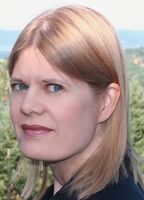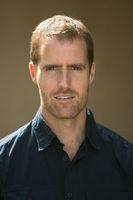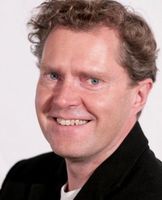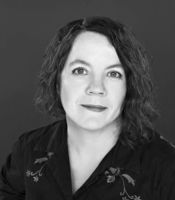The 2016 Weston Prize Finalists on Inspiration & Non-fiction: "Your Books Choose You"
From life as an Israeli soldier to the surprising story behind one of the world's most famous paintings, the fascinating books on this year's Hilary Weston Writers' Trust Prize for Nonfiction shortlist are captivating, varied, and an excellent showcase of the high quality non-fiction writing happening across Canada.
The prize, which is the biggest non-fiction award in the country with a prize purse of $60,000, will be presented tomorrow evening at an event in Toronto, hosted by CBC's Tom Powers, who recently took over popular morning programme Q. Stay tuned to Open Book for news of the winner, as well as the full slate of Writers' Trust literary award winners (tomorrow's ceremony includes a total of seven prizes being presented, collectively valued at over $200,000).
It's a competitive shortlist this year, with five strong titles, including Mad Enchantment: Claude Monet and the Painting of the Water Lilies by Ross King, who was previously nominated for the prize in 2010 and Sixty: A Diary of My Sixty-First Year: The Beginning of the End or the End of the Beginning? by Ian Brown, who won the RBC Taylor Prize in 2010. The 2016 jury is comprised of Carolyn Abraham, Stephen Kimber, and Emily Urquhart.
2016 proved a good year for Penguin Random House Canada, with all five nominated titles published by their imprints.
We're thrilled to be speaking with all five finalists for this year's Weston prize about their books, how they got the nomination news (including who was woken up very early and thought they were still dreaming), and the inherent value of non-fiction writing. Plus, if you're looking for even more great non-fiction reading suggestions (beyond the terrific shortlist itself), each of the finalists offer thoughts on their own favourite non-fiction reads.
Open Book:
How did your nominated book begin for you? What drew you to your subject matter?
Ian Brown:
I had noticed changes in my body, my oldest adviser. For instance, one morning I stepped into the bathroom at work, stepped into a stall, closed the door, locked, it, and began to unbutton my shirt. I have no idea what I intended to do. That, coupled with a little hearing loss – I famously mistook a writer’s interest in gay porn for an interest in Cape Horn, during a meeting – made me begin to research aging. That led me to realize aging had been going on in my 60-year-old body from the very start. And yet like most people I was in full denial. I thought if I paid attention to what actually happened, emotionally and physically, at 60, in the form of a diary, as opposed to what was supposed to happen, I might be able to slow down the passing of time. Not stop it, but at least shape it.
Deborah Campbell:
I had no idea I would write this book when I went to Damascus in 2007 and 2008 to report on the Iraqis who had fled the war in their homeland. But you don’t choose your books, your books choose you. A Disappearance in Damascus chose me when my fixer—a remarkable, funny, fearless Iraqi woman—was arrested while I was with her, leaving me to search for her.
Matti Friedman:
I moved to Israel from Toronto in 1995, when I was 17. Not long afterwards I found myself serving as a soldier at an isolated military outpost called Outpost Pumpkin. It wasn’t in Israel at all, but in a neighbouring country, Lebanon. The physical landscape was beautiful and dangerous, and the human landscape was bewildering. Since then I’ve been trying to unravel the experience, with the idea that buried somewhere in the story of the outpost was something important not just about Israel and the Middle East, but about the universal experience of being a soldier, and about our times. That strange hilltop in the late nineties – that’s the origin of Pumpkinflowers.
Ross King:
I’d been to Giverny a number of times, and I always thought of it as the place of peace and tranquillity that we see represented in Monet’s paintings. But then five or six years ago I read a letter, dated September 1914, in which Monet described how he was going to keep painting despite the war and the threat of German invasion. The Germans, he said, would have to kill him in front of his canvases. I’m always interested in the interplay between great art and acts of barbarism, and it struck me that the large-scale Water Lilies were painted against the backdrop of the horrors of the First World War. So my first motivation was exploring how the war affected and influenced both Monet and his painting.
Your CanLit News
Subscribe to Open Book’s newsletter to get local book events, literary content, writing tips, and more in your inbox
Sonja Larsen:
Since my subject matter is my family I’m not sure it’s so much that I was drawn to the subject as unable to escape it. I spent years trying to distance myself from the past, and in turn, my urge to write, because I knew that would lead me back. And of course it did. After spending so long worried about betraying other people I finally realized the only person I was certain to betray was myself if I didn’t let myself write it.
Open Book:
Where were you when you received news of your nomination? What was your reaction?
IB:
I was at work, at the Globe and Mail, where I work as a roving feature writer. I had been away, and was catching up, and in that flurry got distracted and had no idea I had been nominated. My editor, Anne Collins, sent me an email mid-morning, after she and her team completed the jigsaw puzzle of the nominees. I was thrilled, of course – to be nominated among such strong writers is a great honour.
DC:
I had gone for a run that morning on Salt Spring Island. When I returned my husband greeted me at the door with the news. It was a wonderful surprise.
MF:
I was born and raised in Canada. My brain was formed in Toronto of the eighties and nineties. My writing comes from the tension between where I’m from and where I live now – two very different places. Pumpkinflowers tells a story that happens far from Canada, but it’s a Canadian book, one I wouldn’t have written had I been born anywhere else. All of this is a long-winded way of saying that recognition in Canada has particular significance for me and that when I got the call from Toronto here in Jerusalem, I was thrilled to hear the news.
RK:
I was on the train from Toronto to Kingston, on my way to the Kingston WritersFest. I couldn’t shout for joy or anything like that since it was an early morning train and people around me were dozing! But the rest of the journey was very pleasant, to say the least.
SL:
I live in Vancouver where it is three hours earlier than in Toronto so I was woken up at 6:30 in the morning with an excited call from my editor. In my half-awake state it definitely felt like a bit of a dream!
Open Book:
What unique experience or benefit does non-fiction provide for readers in your opinion?
IB:
Good, well-written non-fiction gives you all the benefits of a well-told story – the satisfaction of having a story unroll in a captivating, engaging way that seems to suspend all your attention – with all the bonus rigor and satisfaction that comes with knowing you are reading a true story, to boot. It’s like candy that is also good for you. It’s hard to believe it exists.
DC:
Non-fiction plunges readers into worlds they would never otherwise see. Readers become the eye-witnesses, vicariously, and experience events from the inside. Good non-fiction has the scope of a novel, while illuminating reality in ways a 30-second news clip cannot.
MF:
Good non-fiction takes us into other people’s minds and teaches us something great about the world. It helps us appreciate the significance in our own lives and see ourselves with a bit of detachment. When it’s done well there’s nothing better.
RK:
I agree with Lord Byron: truth can be stranger than fiction. History especially is mysterious and wonderful, much more than just a collection of facts in a textbook. Good non-fiction can deliver everything that fiction does — plot, character, action, atmosphere, a strong narrative. Fiction may be, famously, “the lie through which we tell the truth,” but non-fiction tries to tell the truth through honesty and patient research.
SL:
I love non-fiction because it’s taking what is fixed or immutable and so often beyond our control – life itself – and creating something that’s cohesive, that teaches and consoles us in some way. And that’s a process everyone goes through, whether they are a writer or not. How can I make sense of this? What do I know to be true?
Open Book:
Tell us about a favourite non-fiction book you've read.
IB:
Oh, there are so many! But one of my all-time favourites is Ian Frazier’s Great Plains, which is what it sounds like, a book about the Great Plains, this vast, largely ignored and thoroughly misunderstood stretch of North America. Frazier turns all that on its head, writing about its history, its practices, its indigenous people, its irrigation wheels, you name it. He’s such a crisp, clear, engaging writer, such a thorough, inspired reporter. And he’s very, very funny. He once described bluegreass coming on the car radio as like a rattling old pickup coming straight at you.
DC:
This summer I read A Woman in Berlin. It’s a diary written by a German woman during the fall of Berlin at the end of the Second World War, when Soviet troops occupied the shattered city and committed the sorts of atrocities occupying soldiers normally do, including rape. The author was a journalist who writes movingly, and without self-pity, about the deals she and other women made to survive. It’s at once a nuanced portrait that manages to see the humanity in both sides, and a critique of the Nazi ideal of German manhood, which immediately collapsed. It was published anonymously in Germany in the 1950s to tremendous backlash. This was seen as a shameful period of history that people wanted to forget. It was re-released, to deserved acclaim, in 2003, after her death.
MF:
Some of my favourite examples are essays, rather than books, and some of the best essays I’ve read can be found in a collection called The Road, by the Russian writer and journalist Vasily Grossman. There’s a whole essay which is just about him looking at a painting. What could there possibly be to say about looking at a painting? Well, if you’re Grossman – incredible observations about history, love, motherhood, loss, and life itself. That one’s called “The Sistine Madonna.” Check it out.
RK:
Last year for my enormously heavy book on Florence I read the late American historian Eric Cochrane’s Florence in the Forgotten Centuries. I was blown away by his combination of brilliant writing — his vignettes of Florentine life would be the envy of any historical novelist — and his mind-boggling scholarship. I still go back to it to enjoy the rhythm of some of his sentences. Not always an easy read, but incredibly rewarding.
SL:
Skin: Talking about Sex, Class and Literature by Dorothy Allison had a very powerful impact on me when I was younger. She was the first person I’d read who wrote about being sexually abused as a child and she had so much insight and compassion into all the ways that could shape a person. And she captured what it felt like to be poor and smart, to be torn between these two ways of thinking about yourself and all the ways that feeling literally worthless could shape your identity and your family dynamics.
Open Book:
What can you tell us about your next project?
IB:
There are two. One is fiction, and the other is not. One is about Banff, the other is about my mother. I hope I don't confuse them, now that I’m over sixty.
DC:
It won’t be about war.
MF:
I’m writing about some of Israel’s first spies, a group of amateurs formed during WWII. It’s not a glamourous espionage story, but one that raises questions about identity, scrambles a few misperceptions about Israel and the people who live here, and tries to say something about loss and displacement in the Middle East right now.
RK:
Not a lot at this moment. Monet has kept me busy for the past few months so I don’t yet have an idea for what comes next. Any suggestions will be gratefully received!
SL:
I have some short stories that are thinking about getting together for a book. So far most of them are about kids who live in a world where the lines between childhood and adulthood are constantly blurring. I think those stories come from my own memory, and also from my experiences working with young people over the last decade. I keep reliving this story in so many different aspects of my life, and I don’t think I’m done yet.
________________________________________________________________
Ian Brown is nominated for the Hilary Weston Writers’ Trust Prize for Nonfiction for Sixty: A Diary of My Sixty-First Year: The Beginning of the End or the End of the Beginning?, published by Vintage Canada.
Deborah Campbell is nominated for the Hilary Weston Writers’ Trust Prize for Nonfiction for A Disappearance in Damascus: A Story of Friendship and Survival in the Shadow of War, published by Knopf Canada.
Matti Friedman is nominated for the Hilary Weston Writers’ Trust Prize for Nonfiction for Pumpkinflowers: An Israeli Soldier’s Story, published by Signal/McClelland & Stewart.
Ross King is nominated for the Hilary Weston Writers’ Trust Prize for Nonfiction for Mad Enchantment: Claude Monet and the Painting of the Water Lilies, published by Bond Street Books/Doubleday Canada.
Sonja Larsen is nominated for the Hilary Weston Writers’ Trust Prize for Nonfiction for Red Star Tattoo: My Life as Girl Revolutionary, published by Random House Canada.







